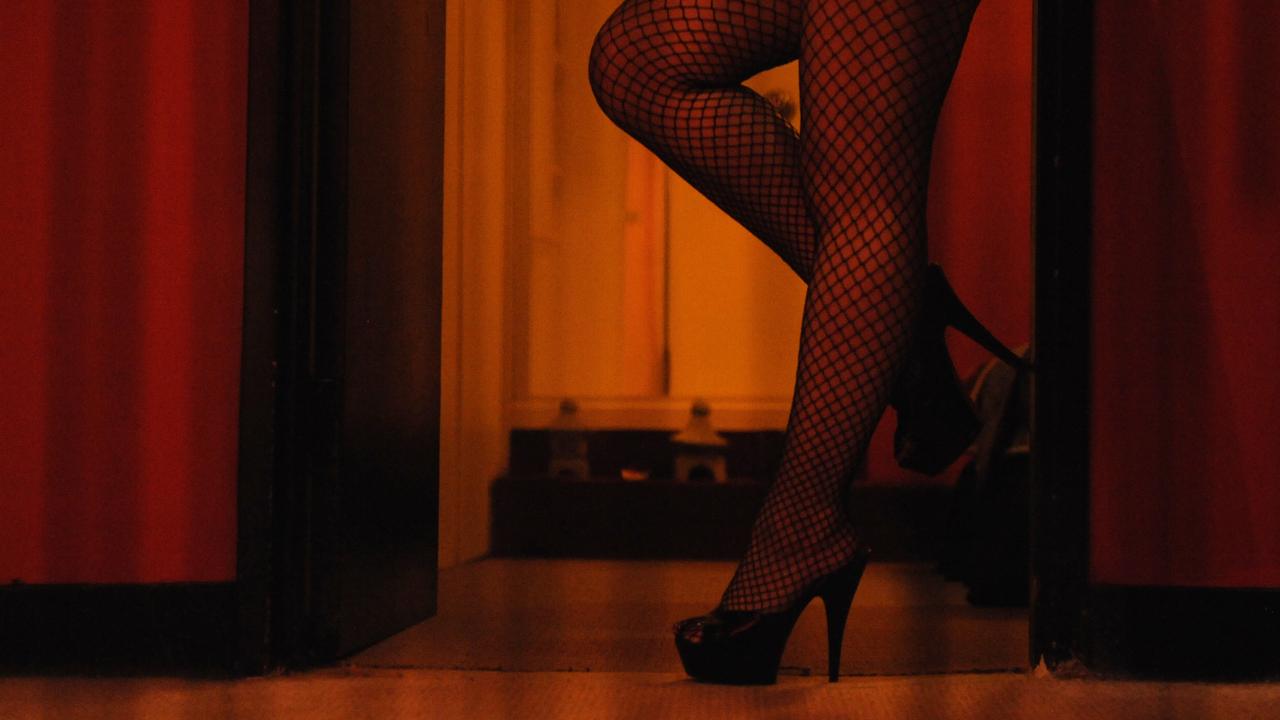Common act sex workers can’t do in Queensland
There’s plenty of things sex workers can legally do but those in the industry are smarting from “bizarre” red light red tape making their work a minefield.
It’s the “bizarre” act of subterfuge that sex worker Mandy, from Brisbane, has to perform whenever a client arrives from or leaves the hotel where she hosts them.
Her fellow sex workers, in the hotel room next door – also working or even just hanging out – have to suddenly stop what they’re doing and go quiet desperately hoping the client doesn’t twig they’re there.
“Every time a client came and went we’d all have to hide and be really quiet. We’re not afraid of the clients, but the police because it could be an undercover sting,” the full service, private sex worker, told news.com.au.
“It’s really frustrating that we are put in this bizarre situation.”
This situation wouldn’t happen just across the border in NSW, which has decriminalised sex work. In Queensland sex work is allowed but there are so many legal pitfalls workers say something that wouldn’t even raise an eyelid south of the Tweed River risks them being hauled in front of a judge.

COMMON THING QLD SEX WORKERS CANNOT DO
Queensland Police said it was “obligated to investigate offences against Queensland legislation” but would not comment on policing methods. The service pointed to recent arrests of people accused of forcing women into sex work.
But Dr Elena Jeffreys, state co-ordinator of sex workers organisation Respect Inc., told news.com.au decriminalisation was the answer and the myriad laws surrounding the industry was putting workers’ safety at risk.
“Every industry has safety strategies,” she said. “Sex workers are no different. Sex work is work, and yet we are dealing with laws that you might have expected to see in the 1800s not 2021.”
On February 10, Respect Queensland and #DecrimQLD will hold an online forum focusing on how the state’s confusing, and some say baffling, laws can impact safety.
According to the Prostitution Act 1999, if a sex worker does business outside of a brothel there is one thing they absolutely cannot do – and that’s operate with another sex worker. They must work alone. Even if, workers say, that puts them at risk.
The act is strikingly broad in its definition of working alone. It doesn’t just mean two sex workers hosting the same client. Two sex workers who chip into buy a hotel room but use it separately, with separate clients, would also fall foul of the law.
“I used to work with four other private, full-service, sex workers and we would book a couple of rooms. We would work separately but share overheads and we would feel safe,” said Mandy, who did not want to use her full name.
“If one of us ever had a situation we knew the others would have our backs.”
She knew she was breaking the law, but there was no other way. “In Queensland, we need to choose between working legally or safely. My choice is safety, even if that means running the risk of being arrested and fined.”
Just texting another sex worker to say you’re meeting a client is illegal.

RED LIGHT RED TAPE
Dr Jeffreys said the regulations were “illogical and dangerous” particularly as many sex workers don’t tell people outside the industry about their profession.
“If your daughter was going to meet a Tinder date you would want them to let someone know where they are and check-in that they’re OK,” she said.
“I don’t think anyone would see value in maintaining laws that criminalise sex workers doing the same.”
The red tape for the red light industry is perplexing. Private sex workers can hire a driver but the driver has to hold a license as a crowd controller and can only work for a single sex worker. If they drive for one sex worker on a Friday and another on a Saturday, they’re law breakers.
Mandy said the bar on working with other sex workers reached ludicrous proportions when she had an ex-partner who was also in the industry.
“We couldn’t have any messages in our phone about work, so we’d constantly delete them. I couldn’t work from home because if they were in another room, we’d be charged. If one us drove the other to a client, they could be breaking the law,” she said.
“If you end up in court, your name and where you live can be printed – you can be pretty much outed as a sex worker and that can be devastating.”

DECRIMINALISATION CALL
In 2019, the Queensland Government said it would soon ask the Queensland Law Reform Commission to look at regulations surrounding sex work. Eighteen months later the matter has still not been referred to the commission.
The Queensland Attorney-General’s Department, which oversees sex worker laws, did not comment when questioned about the progress of the inquiry.
In the meantime, Respect Inc. has said there should be a moratorium on police posing as clients. Officers have been known to visit sex workers undercover in order to see if they are – or could be cajoled – into breaking the law.
“Clients ask us all the time for unprotected sex but that’s illegal in Queensland,” Mandy said.
“The police can come in undercover and ask us to do it and they might offer higher rates to do something we might not normally consider to see if we’ll break the law. Its entrapment and coercion and they have full immunity to do that.”
If the police even suspected other sex workers were in the room next door, they might search the premises and haul everyone to court.
Mandy said there had been three occasions where a client put her in an unsafe position.
“But I’ve never reported any crime to the police because I just have no confidence in them.”

POLICE ‘SEXUAL SERVITUDE’ ARRESTS
In a statement to news.com.au, the Queensland Police Service (QPS) said it was “committed” to protecting the safety of sex workers.
“The QPS do undertake investigations and activities across the state aimed at ensuring compliance and offences which may occur within these premises in addition to investigations where illegal sex work is being undertaken outside licenced brothels.
“The QPS is obligated to investigate offences against Queensland legislation. Matters are investigated using the same process as any criminal offence committed against Queensland legislation. It is not appropriate to release specific details of methodologies and ongoing police investigations of illegal prostitution for offences relation to the Prostitution Act.”
On Thursday, officers from the Prostitution Enforcement Taskforce charged a Brisbane man and woman with multiple offences including sexual servitude. Police allege a number of women were being given stupefying drugs and forced into sex work.
However, sex workers have said these arrests could still have taken place if the industry was decriminalised.
“Rape is still rape, assault is still assault, trafficking is still trafficking under decriminalisation. Those things are not sex work,” said Mandy.
“Sex work is not inherently dangerous. But the law surrounding it makes it more dangerous.”




